 Learn
to Fly (Bell Asher Records) is the first disc in
six years by The Delgado Brothers. It's been
way too long for these East L.A. cats who just don't
venture into the studio often enough. If you're
already on The Delgado Brothers bandwagon, then
you'll know what to expect here. If not, then
understand that these guys don't play anything
resembling straight blues. In fact, their sound is
really hard to categorize. Let's just call it
'Delgado Brothers music.'
Learn
to Fly (Bell Asher Records) is the first disc in
six years by The Delgado Brothers. It's been
way too long for these East L.A. cats who just don't
venture into the studio often enough. If you're
already on The Delgado Brothers bandwagon, then
you'll know what to expect here. If not, then
understand that these guys don't play anything
resembling straight blues. In fact, their sound is
really hard to categorize. Let's just call it
'Delgado Brothers music.'
The CD commences with the catchy, Santana-ish title
cut, with brothers Steve and Joey sharing the
vocals. Victor Bisetti's Latin percussion work sets
the appropriate tone here. The soulful "I Wanna
Know," with some nice guitar work from Joey Delgado
and vocals shared by Steve Delgado and guest Sherry
Pruitt.
Dave Melton adds slide guitar to Joey Delgado's
sensitive vocals on the love song, "Be the One"; the
extra guitar accompaniment compliments the rest of
the band quite nicely on this tune. Steve then sings
about a girl, "Melissa," that he used to love,
perhaps from afar. Has anyone seen her? Sherry
Pruitt joins in again with her gospel-influenced
voice.
The listeners get a real treat when The Chambers
Brothers provide their street corner background
vocals behind Steve's plaintive singing on the slow
number "If the World." Take it to church, my
friends!
Just when you think that maybe you've figured out
The Delgados' sound, they take it down Louisiana way
on the funky, second line number "Lafayette." The
band also shows an ability to put out a classic soul
sound on "All I Have," with lead vocals by Steve
backed by Sherry Pruitt, Joey Delgado and John
Avila.
The closing cut could perhaps be autobiographical,
as Steve sings of his love for his brother (or
brothers, perhaps) on "Oh, Brother." It's a slow
number with sparse accompaniment that brings
Learn to Fly to a satisfying end. For more info
on this wonderful group, check their site at
www.delgadobrothers.com. Perhaps you will join
me on their bandwagon --- it's indeed a happy place.
--- Bill Mitchell
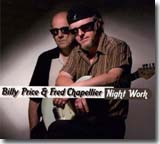 Pittsburgh
soul/blues crooner Billy Price always teams
up with a dynamic blues guitarist, which makes his
partnership with Fred Chapellier, a native of
France, a natural combo on Night Work (DixieFrog
Records). It's typical Billy Price sound on this CD,
which means plenty of gritty soul vocals and
stinging blues guitar.
Pittsburgh
soul/blues crooner Billy Price always teams
up with a dynamic blues guitarist, which makes his
partnership with Fred Chapellier, a native of
France, a natural combo on Night Work (DixieFrog
Records). It's typical Billy Price sound on this CD,
which means plenty of gritty soul vocals and
stinging blues guitar.
The album starts with what I consider the weakest
cut, a snaky, midtempo tune "Smart Money,"
co-written by Price and Chapellier. I just don't
think it has the same punch as the rest of the album
and doesn't show Price's great vocal range. The
tempo stays the same on "My Love Comes Tumbling
Down," but now we're hearing Price testifying as his
voice is punctuated by some tasty blues licks from
Chapellier. We then move on to the title cut, a
midtempo blues shuffle that showcases both the horn
section and the blues harmonica work of guest
instrumentalist Mark Wenner (of Nighthawks fame).
Price's affection for the late great soul singer O.V.
Wright shows on two occasions on Night Work:
a slow, bluesy version of Wright's Don't Let My Baby
Ride" and the band's own soulful tribute,
appropriately titled "O.V. Wright," complete with
verses of Wright songs interspersed with tales of
riding around with his girl listening to O.V.'s
music.
The venerable Otis Clay joins in for a very nice
version of Al Green's "Love and Happiness." Clay's
voice never sounded better, although a minor nit is
that the recording quality of his vocals are a
little cold and tinny. No matter, because a voice as
wonderful as Clay's overcomes the less than perfect
recording condition. Chapellier chips in with one of
his hottest guitar solos of the night towards the
end of the number.
Price reprises the excellent uptempo number "Who
You're Workin' For," which he originally recorded 20
or so years ago on Free At Last. Wenner's
fantastic blues harp playing makes this one the
definitive version. "Who You're Workin' For" is one
of the highlights of Night Work.
Chapellier really gets to turn it loose with some
incendiary blues guitar on "Under The Influence," a
song he co-wrote with Price. "All The Love in the
World" is a slow blues that shows that Price is more
than just a soul man; I've heard him really, really
sing the blues in person, and he does it here on
this number.
The disc ends with an instrumental, "Skunk Shuffle,"
that showcases every band member, but the real
closer is a funky joint autobiography, "Champagne
Blues and Pittsburgh Soul," which wraps up this fine
CD very nicely. It proves that the partnership is a
lucrative one. We will hopefully hear more from the
combination of Price and Chapellier in the future.
--- Bill Mitchell
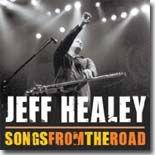 Jeff Healey’s death last March after a long
battle with cancer hit many guitar fans hard.
Healey’s unique guitar style appealed not only to
blues fans, but also rock and jazz fans, as the
versatile guitarist was amazingly adept in all three
genres. Several of my friends who were fans wondered
if there were any unreleased Healey recordings
stored away somewhere. The answer to that question
is an unequivocal “yes,” as evidenced by the recent
release, Songs From The Road (Ruf Records).
Jeff Healey’s death last March after a long
battle with cancer hit many guitar fans hard.
Healey’s unique guitar style appealed not only to
blues fans, but also rock and jazz fans, as the
versatile guitarist was amazingly adept in all three
genres. Several of my friends who were fans wondered
if there were any unreleased Healey recordings
stored away somewhere. The answer to that question
is an unequivocal “yes,” as evidenced by the recent
release, Songs From The Road (Ruf Records).
Recorded over a 15-month period between August
of 2006 (Notodden Blues Festival in Norway), May of
2007 (the Islington Academy in London) and November
of 2007 (Jeff Healey’s Road House in Toronto), Songs
From The Road offers a wide-ranging mix of blues
(Robert Johnson’s “Stop Breaking Down” and Muddy
Waters’ “I’m Ready”), 60’s rock and pop (Cream’s
“White Room,” CSN’s “Teach Your Children,” a
sizzling version of the Allman’s “Whipping Post,”
and a pair of Beatle covers – “Come Together” and
“While My Guitar Gently Weeps”), and even a few
tracks familiar to Healey’s fans (his major hit,
“Angel Eyes,” and “I Think I Love You Too Much,”
penned by Mark Knopfler).
Healey’s regular working band (Dan Noordermeer –
guitar and vocals, Alec Fraser – bass and vocals on
“White Room,” Dave Murphy – keyboards and vocals on
“Whipping Post,” and Al Webster – drums) are joined
by former BTO frontman Randy Bachman on the album’s
centerpiece, a fantastic cover of “Hoochie Coochie
Man.” As always, they provide first-rate support to
Healey, who is simply spectacular. He never gave
less than an inspired performance, even after he
became seriously ill.
For fans of Jeff Healey, Songs From The Road is an
essential purchase. For those unfamiliar with the
talent and versatility of this amazing guitarist who
left us much too soon, this disc is a nice place to
hear what all the fuss was about. Let’s hope there’s
more music of this quality still in the vault.
--- Graham Clarke
 When Dani Wilde was 14 years old, she attended the Bishopstock Blues Festival in the U.K. and saw Sue
Foley, Shemekia Copeland, and Susan Tedeschi
perform. Up until that time, she had only heard the
blues done by John Lee Hooker, Muddy Waters, and
others, but seeing young women on stage playing the
blues inspired her to follow in their footsteps. Her
deep soul vocals landed her a gig with British folk
singer Maddie Prior and her guitar skills won her an
even wider audience.
When Dani Wilde was 14 years old, she attended the Bishopstock Blues Festival in the U.K. and saw Sue
Foley, Shemekia Copeland, and Susan Tedeschi
perform. Up until that time, she had only heard the
blues done by John Lee Hooker, Muddy Waters, and
others, but seeing young women on stage playing the
blues inspired her to follow in their footsteps. Her
deep soul vocals landed her a gig with British folk
singer Maddie Prior and her guitar skills won her an
even wider audience.
In 2007, she signed a record deal with Ruf Records,
which resulted in her taking part in the annual
Blues Caravan Tour with fellow Ruf artists Deborah
Coleman and Candye Kane and appearing on the live
disc, Blues Caravan: Guitars & Feathers. Now Ruf has
released her debut solo album, Heal My Blues, a
non-stop blues-rock guitar fest.
Wilde is a powerful guitarist and an incredibly
expressive singer, who wrote eight of the 11
tracks here. Her original compositions are mostly
high-energy modern blues, including “Bring Your Lovin’ Home,” the sizzling title track, “Come
Undone,” and “Testify.” She can also slow it down
for tracks like “I Love You More Than I Hate Myself”
and “People Like You.” She does a fine job covering
some familiar tunes, John Lee Hooker’s “In The
Mood,” Mel London’s “Little By Little,” and Norman
Whitfield’s “I’m Going Down.”
Equally exciting is Wilde’s kid brother, Will
“Harmonica” Wilde, a dazzling young harp player who
plays like a man possessed, notably on “Slow Coach,”
the best of Wilde’s original compositions. Also
contributing are Ian Parker, who plays guitar on
three tracks, ”Morg” Morgan, who shines on keyboards
throughout, Mike Griot on bass, and Denis Palatin on
drums.
Heal My Blues is an impressive debut release from Dani Wilde. She’s well on the way to being compared
favorably with those ladies who initially inspired
her to play the blues.
--- Graham Clarke
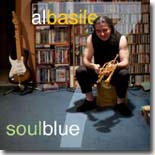 Soul Blue 7 (Sweetspot Records) is Al Basile’s
seventh release and like the previous six, it
showcases his wonderful compositional skills and
encompasses blues, soul, jazz, swing, pop, and even
reggae. It also features most of the original
Roomful of Blues line-up (including Duke Robillard
on guitar) in support, which is never a bad thing.
Basile started out as a writer, composing songs as
well as novels and poetry. Music has always been a
part of his life though. He started playing trumpet
as an eight-year-old and has played with Robillard
since their teenage years. Forty years later, their
interplay is seamless.
Soul Blue 7 (Sweetspot Records) is Al Basile’s
seventh release and like the previous six, it
showcases his wonderful compositional skills and
encompasses blues, soul, jazz, swing, pop, and even
reggae. It also features most of the original
Roomful of Blues line-up (including Duke Robillard
on guitar) in support, which is never a bad thing.
Basile started out as a writer, composing songs as
well as novels and poetry. Music has always been a
part of his life though. He started playing trumpet
as an eight-year-old and has played with Robillard
since their teenage years. Forty years later, their
interplay is seamless.
Basile wrote all 13 songs, ranging from the
easy swing of “You Showed Me Something,” to the
funky R&B of “Dollar To A Dime” (which features a
smooth trumpet solo from Basile and sparking piano
from Bruce Katz), to the opener, “Housekey Blues,”
which has a New Orleans second-line feel. “Causing
Joy” features playful pop-styled lyrics with a
reggae beat, and “Where Are You Tonight” is a deep
soul track about a woman who causes disappointment
over and over again.
Basile’s unique lyrics are particularly noteworthy
on “I Hope You’re Right,” where he hopes he’s able
to live up to his woman’s great expectations, and
“Fool Me Again,” with a protagonist who’s waiting to
be double-crossed by his lover yet again. The
closing track, “Termites In My Basement,” is a
traditional blues track, featuring Sugar Ray Norcia
on harmonica, about growing old.
In addition to Robillard and Katz, who is
superlative throughout on the keys, the band
features Marty Ballou (bass), Mark Teixeira (drums
and
percussion), Doug James (tenor and baritone sax),
Rich Lataille (alto sax), Carl Querfurth (trombone),
and Sax Gordon Beadle (tenor sax solo on “Where Are
You Tonight”).
Soul Blue 7 is an excellent listen from start to
finish. Great songs, music, and performance make
this one a keeper.
--- Graham Clarke
 Those of you who picked up Ronnie Earl’s most recent
release, Living In The Light, are already familiar
with Dave Keller. Keller contributed two vocals to
the disc, including a stunning reading of Bob
Dylan’s inspirational “What Can I Do For You.” The
Massachusetts native has spent a lot of time
performing in the Northeast and has garnered rave
reviews from artists like Earl, Mighty Sam McClain,
and Paul Rishell. In addition to being a fine
singer, Keller is also an excellent guitarist,
bringing to mind multitalented artists like James
Hunter, and also blows a mean harmonica.
Those of you who picked up Ronnie Earl’s most recent
release, Living In The Light, are already familiar
with Dave Keller. Keller contributed two vocals to
the disc, including a stunning reading of Bob
Dylan’s inspirational “What Can I Do For You.” The
Massachusetts native has spent a lot of time
performing in the Northeast and has garnered rave
reviews from artists like Earl, Mighty Sam McClain,
and Paul Rishell. In addition to being a fine
singer, Keller is also an excellent guitarist,
bringing to mind multitalented artists like James
Hunter, and also blows a mean harmonica.
Keller also wrote all the songs for his latest
release, Play For Love (Tastee-Tone Records), a
strong set of soul and blues. Most of the lyrics
have a highly personal slant to them. The opener,
“Here I Am,” features a little guitar intro that’s a
mixture of Otis Rush and T-Bone Walker. It’s one of
many tracks that include soulful Hammond B3work from
Ira Friedman. “Take Your Time” is a tender tune
Keller wrote for his young daughters, and “To The
City” is a metaphorical glimpse at Keller’s life to
date.
The title cut deals with the true reason that most
musician start and continue to ply their craft, and
“Only Place I’m Going (Is Down)” is about a man who
is seemingly stuck in neutral while everything and
everybody around him is changing. “Something’s Gotta
Give” deals with the struggles of making marriage
work, and “It’s Only Human” conveys a real sense of
want, despair, and even some desperation. “All Souls
Are Built For Flying” is a song inspired by Keller’s
youngest daughter, and “Gabriella” is a “happy
accident,” an impromptu jam session while tuning up
that turned into an actual album track.
Joining Keller and Friedman are Jan Schultz (Fender
bass) and Brett Hoffman (drums). Keller produced the
disc and it has a warm, homey feeling to it.
Actually the whole disc is that way. Keller is a
stay-at-home dad who makes his living teaching
guitar to 35 students a week and playing about ten
gigs a month. It’s obvious that he loves what he
does, but he also knows and appreciates what’s
really important in life.
Play For Love is one of those nice little discs that
you sometimes stumble upon that’s full of surprises
and exceeds your expectations. Here’s hoping, based
on this release and his recent work with Ronnie
Earl, that Dave Keller gets a little attention
outside of the New England area.
--- Graham Clarke
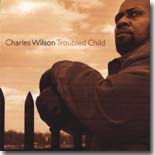 I used to absolutely love soul/blues, dating back to
when it was just called plain old soul music. I hit
the wall with the style around the mid to late ’80s,
when most of the records started sounding alike,
mostly due to production values like those
computerized drums and synthesizers standing in for
the horn section. It got to the point that I
couldn’t tell songs apart and who was even singing
them, so I drifted away from the style except for
rare instances, but continued to try to keep up with
it on local radio stations (most stations in
Mississippi play lots more soul/blues than the more
traditional style) occasionally.
I used to absolutely love soul/blues, dating back to
when it was just called plain old soul music. I hit
the wall with the style around the mid to late ’80s,
when most of the records started sounding alike,
mostly due to production values like those
computerized drums and synthesizers standing in for
the horn section. It got to the point that I
couldn’t tell songs apart and who was even singing
them, so I drifted away from the style except for
rare instances, but continued to try to keep up with
it on local radio stations (most stations in
Mississippi play lots more soul/blues than the more
traditional style) occasionally.
Troubled Child, the latest disc by the incredible
Charles Wilson, represents the way they used to do
them, folks. Wilson seemed to hit the mark on his
last disc for Delmark, but with this latest effort
on Severn, he may have outdone himself. Backed by
the Severn “house band” of Steve Gomes on bass (who
also co-produced the disc with David Earl and
contributed a couple of songs), Robb Stupka on
drums, and Benjie Porecki on keyboards, along with
the appropriately nicknamed “Monster” Mike Welch on
guitar, plus a horn section and strings (arranged by
the great Willie Henderson), Wilson is in the zone
unlike anyone since Michael Jordan in the 1992 NBA
Finals.
Troubled Child has ten tracks of the real
stuff….vintage soul, ranging from Bobby Bland’s
classic, “Where My Baby Went,” to “Somebody’s
Tears,” a lovely tribute to Wilson’s uncle, the late
Little Milton Campbell, and Sam Dees’ moving title
track. Bob Marley’s reggae standard, “Is This Love,”
gets a major Memphis soul makeover, and George
Jackson’s “I Don’t Want To Take A Chance” is also
first-rate, as is a cover of Clay Hammond’s “The
Good Side of My Girl.” Producer Gomes also wrote a
couple of songs that fit perfectly with the older
material.
Earl and Gomes have captured the classic sound of
those great soul records of the ’60s and ’70s and
with Charles Wilson providing his smooth, but potent
vocals, Troubled Child stands as one of the best
releases of 2009 so far.
--- Graham Clarke
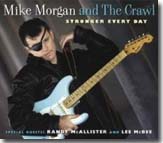 Mike Morgan and The Crawl first made a lot of noise
with a group of sizzling releases on Black Top
Records in the late ’80s/early ’90s. In those days,
Morgan’s hard-driving, aggressive Texas blues guitar
attack was often complimented by lead singer Lee McBee’s raucous vocals. After Black Top’s demise,
McBee left the band to lead his own group in his
hometown of Kansas City. Morgan moved on to Severn
Records and his third release for that label, the
aptly titled Stronger Every Day, reunites Morgan
with McBee for a few tracks.
Mike Morgan and The Crawl first made a lot of noise
with a group of sizzling releases on Black Top
Records in the late ’80s/early ’90s. In those days,
Morgan’s hard-driving, aggressive Texas blues guitar
attack was often complimented by lead singer Lee McBee’s raucous vocals. After Black Top’s demise,
McBee left the band to lead his own group in his
hometown of Kansas City. Morgan moved on to Severn
Records and his third release for that label, the
aptly titled Stronger Every Day, reunites Morgan
with McBee for a few tracks.
While Morgan’s guitar shows influences of Texas
string benders like Stevie Ray Vaughan, Anson
Funderburgh, T-Bone Walker, and Frankie Lee Sims,
his compositions also show an influence by soulsters
like Otis Redding. There’s also a hint of Louisiana
swamp pop on tunes like “Sweet Angel” (sung by McBee),
and Memphis soul (“When I Get Back Home,” sung by
Randy McAllister). “The Birthday Song” is in a
similar vein and features a nice vocal from Morgan,
as is “Where’s The Love.”
Other highlights include the opening track, the
blues rocker “All Night Long,” the acoustic “How
Much More Time,” which has a southern rock feel, a
rip-roaring take of Clarence “Gatemouth” Brown’s
“Okie Dokie Stomp,” the slow blues, “I Cried For My
Baby,” and “Funky Thang,” an instrumental workout.
The three vocalists each bring a little something
different to the disc and the variety provided is a
plus. Morgan is much improved as a singer and seems
most confident on the more soul-oriented tracks, but
he’s more interesting when he’s playing guitar.
Others contributing to Stronger Every Day include
two of Funderburgh’s Rockets (Rhandy Simmons – bass,
Danny Cochran – drums), along with Brian Ferguson
(drums), Drew Allain and Sonny Collie (bass), and
Stefano Intelisano and Mike Hanna (organ).
A well-crafted release that you may have initially
missed (it was released in late 2008), Stronger
Every Day shows Mike Morgan to be an artist who is
still taking chances, venturing into rock and soul
while staying firmly rooted in the blues.
--- Graham Clarke
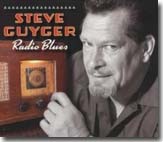 Steve Guyger has been playing the blues for four
decades and is recognized as one of the best
harmonica players in the world today. He’s played
with many of today’s modern legends (Carey Bell, Rod
Piazza, Charlie Musselwhite, Little Sammy Davis,
Rick Estrin, Kim Wilson, and Mark Hummel) and has
fronted his own band, the Excellos, for over 30
years. His most recent release, 2008’s Radio Blues
(Severn Records), is a stellar set featuring classic
blues from the ’50s and ’60s, or new songs
influenced from that era.
Steve Guyger has been playing the blues for four
decades and is recognized as one of the best
harmonica players in the world today. He’s played
with many of today’s modern legends (Carey Bell, Rod
Piazza, Charlie Musselwhite, Little Sammy Davis,
Rick Estrin, Kim Wilson, and Mark Hummel) and has
fronted his own band, the Excellos, for over 30
years. His most recent release, 2008’s Radio Blues
(Severn Records), is a stellar set featuring classic
blues from the ’50s and ’60s, or new songs
influenced from that era.
Featuring an experienced band in support (Fabulous
T-Bird guitarist Johnny Moeller, bass player Steve
Gomes, drummer Rob Stupka, and Bill Heid on
keyboards), Guyger tears through a first-rate set of
songs with covers like Joe Liggins’ “The
Honeydripper,” Muddy Waters’ “Let Me Hang Around,”
Kansas Joe McCoy’s “Oh Red,” and Rudy Toombs’ “I’m
Shakin’.”
On the original compositions, Guyger takes it from
straight blues (“Lookie Here,” “You’re So Fine,”
“Blues Won’t Let Me Be”) to early rock & roll
(“Little Rita,” “I Can See By Your Eyes”) to old
school R&B with a Diddley beat (“Afghan Rumble,”
“Hey Little Baby”). The new songs capture the mood
perfectly and sound like they easily could have come
from the era.
Guyger shows why he’s considered a harp master by
fellow players like Jerry Portnoy and Rick Estrin,
and his vocals are confident and convincing. The
band, particularly Moeller, perfectly recreate the
sound and feel of those wonderful Chess and Excello
recordings from 50 years ago.
The fact that Radio Blues respectfully honors the
music of days gone by while still maintaining a
fresh, original atmosphere as well is a testament to
the talents of Steve Guyger, as well as his
co-producers Gomes and David Earl. Radio Blues
should appeal to fans of classic or modern blues.
--- Graham Clarke
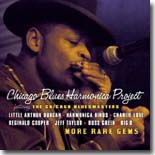 In 2005, Severn Records released Diamonds In The
Rough, by The Chicago Blues Harmonica Project.
Consisting of six unsung harmonica wizards from the
Windy City, the disc was well received and
critically acclaimed. Due to the positive reception,
Severn has released a follow-up disc, More Rare
Gems, featuring six more harmonica talents
performing two songs apiece, belying the notion that
the blues harmonica player was nearing extinction in
Chicago.
In 2005, Severn Records released Diamonds In The
Rough, by The Chicago Blues Harmonica Project.
Consisting of six unsung harmonica wizards from the
Windy City, the disc was well received and
critically acclaimed. Due to the positive reception,
Severn has released a follow-up disc, More Rare
Gems, featuring six more harmonica talents
performing two songs apiece, belying the notion that
the blues harmonica player was nearing extinction in
Chicago.
More Rare Gems features a couple of players
who might be familiar to blues fans: the late Little
Arthur Duncan and Harmonica Hinds, who previously
recorded with Koko Taylor. Duncan’s selections are
“Can’t Stand It No More,” which owes a debt to Billy
Boy Arnold’s “Prisoner’s Plea,” and Muddy Waters’
“Gone To Main Street,” while Hinds offers the
comical “Kill That Mouse,” and an upbeat
instrumental, “Sunday Morning Blues.”
The remaining four harp players are relative
newcomers to recording. In fact, two of their
number, Jeff Taylor and Charlie Love are better
known in Chicago for playing other instruments
(Taylor – drums, and Love – guitar). Love acquits
himself well with a cover of Howlin’ Wolf (“Ooh
Baby, Hold Me”) and Elmore James (“The Year Old
Boy”), and Taylor tackles Johnny “Guitar” Watson’s
“Gangster of Love” (vocal only, with harmonica from
Russ Green, who performed on the first Project CD),
and Jimmy Reed’s “Honest I Do.”
Reginald Cooper, a relative newcomer to performing,
does a nice version of “Shade Tree Mechanic,” and a
slowed-down “Give Me Back That Wig,” and Big D, the
youngest player of the bunch, gets downright swampy
with his version of “I’ve Got To Be With You
Tonight” and the lively “Well You Know.”
Offering fine support are The Chicago Bluesmasters,
which include Twist Turner (drums), Rick Kreher and
Illinois Slim (guitars), E.G. McDaniel (bass), Max
Brumbach (piano). The session was also produced by
the Bluesmasters and recorded at Turner’s Delta
Roots Sound Studios.
Fans of blues harmonica will enjoy this disc as much
as they did the first one. More Rare Gems shows that
the future of Chicago blues harmonica, is in good
hands. Little Walter would be proud.
--- Graham Clarke
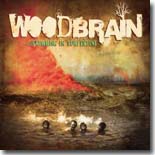 Woodbrain may look like your basic four-piece blues
band, but there’s much more to them than meets the
eye. The Portland, Oregon-based quartet’s brand of
blues also incorporates rock, jazz, and Americana in
equal doses, owing as much to John Coltrane and
Derek Trucks as they do Son House or Skip James.
It’s an irresistible blend, as heard on their latest
CD, Swimming in Turpentine, on Yellow Dog Records.
Woodbrain may look like your basic four-piece blues
band, but there’s much more to them than meets the
eye. The Portland, Oregon-based quartet’s brand of
blues also incorporates rock, jazz, and Americana in
equal doses, owing as much to John Coltrane and
Derek Trucks as they do Son House or Skip James.
It’s an irresistible blend, as heard on their latest
CD, Swimming in Turpentine, on Yellow Dog Records.
Improvisation is the name of the game with Woodbrain,
as many of these arrangements were still in the
assembly stage as the tape was rolling in the
studio. The looseness works well on tracks like
“Port Chicago Highway” and “Dig,” a manic track
featuring guitarist/singer/songwriter Joe McMurrian
on banjo that the band learned about ten minutes
prior to recording it. “Northbound” has an urgency
and urgency that’s propelled by the fervent
harmonica of David Lipkind.
The old blues standard, “Shake ‘Em On Down,” is
brought into the 21st Century with a jolt. Bukka
White probably wouldn’t have recognized this version
if it was standing in front of him. McMurrian’s
growl and screaming fretwork combined with Lipkind’s
other-worldly harmonica make this one of the
standout tracks. Others include the country-flavored
“Home Of My Own,” “Storm Clouds,” a slower tempo
track that, though more sedate than other cuts, is
no less intense, and “Black Water Side,” the old
Bert Jansch song is transformed into funky workout
that shows Americana music at its best.
The rhythm section of Woodbrain is Jason Honl (bass)
and Jimi Bott (drums) is excellent, providing the
perfect backdrop for McMurrian’s songs and his
gritty vocals and even grittier guitar. They are
able to blend their influences together seamlessly,
creating their own unique vision of the blues, as
can be heard on the closing instrumental,
“Pottsville Conglomerate.”
You see the term “Brave New Blues” bandied about
quite a bit, but in this case, it certainly applies.
These guys are absolutely fearless, taking the blues
in directions where few have ventured.